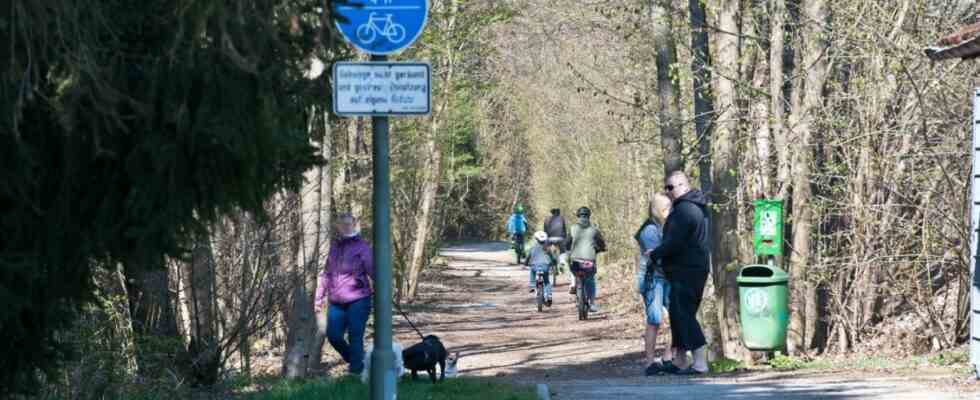The greater community is continuing its efforts to create a cycle path along the railway – despite considerable doubts from politicians. On Tuesday, the responsible committee of the municipal council decided to award the planning services for the approximately three-kilometer section at a cost of 170,000 euros. The construction costs are likely to be many times that amount, according to an estimate from this spring, around 3.5 million euros.
The upgrading of the path south of the railway line is part of a project that spans municipalities and districts called “Fast Cycle Path”. The idea behind it is, after the construction of the high-speed cycle paths between Munich and the surrounding area is not making any real progress, to expand existing paths between the state capital and the districts. Several local branches of the Greens in the east of Munich brought up the proposal last year. Like the neighbors in Haar, Vaterstetten also had an investigation carried out to determine whether and how the unpaved railway service road could be upgraded to become a cycle path.
Lush subsidies of up to 80 percent of the costs are attractive for expansion and planning
The feasibility study presented in May by the Wipfler Plan office showed that it could work. That it will also be complex and expensive. Because the current gravel path would not only have to be asphalted, but also widened, there should also be lighting and a bridge should be built over Möschenfelder Straße – according to the planners, this alone accounts for a good third of the total costs. However, only 20 percent of these are to be borne by the municipality itself, the largest part is to come from a support program of the Free State.
Even then, the committee had some reservations and doubts about the project. On the part of the SPD, there was concern that the path could no longer be used by pedestrians after the expansion. In addition, it was criticized that the new, improved cycle path would not be of much use to cyclists in the community, as it had too few connections to the residential areas. For commuters to and from Munich, an expansion of the cycle paths on the B 304 is considered more sensible anyway.
SPD parliamentary group leader Josef Mittermeier has now repeated this criticism, saying that the B 304 is considered to be much better suited as a commuter route. He also suggested checking whether the path along the track should be tarred. David Göhler (Greens), on the other hand, expressly favored the expansion of the railway line. This is “where the people live”, in contrast to the main road on the outskirts.
The path should continue to be usable for pedestrians even after the expansion
Several speakers warned once again to be considerate of pedestrians. He is often on the road himself, said Günter Lenz (SPD) “there is always something going on”. Albert Wirth (CSU) made a similar statement: “The path is heavily frequented, it is important not to forget the pedestrians.” The trail is also very popular with dog walkers. According to his impression, according to Klaus Willenberg (FDP), the path is currently used more by pedestrians than by cyclists.
Despite the concerns, his parliamentary group will vote for the plans to be awarded, said Mittermeier, and Mayor Leonhard Spitzauer (CSU) also advocated this. Once they have been determined, they will discuss with the planners how the community envisages the expansion of the path in concrete terms.
Whether this expansion is possible at all ultimately depends on Deutsche Bahn, which owns the path. When asked by Göhler whether there had already been talks between the railway company and the municipality, Brigitte Littke, head of the building authority, explained that this could only be done when there was a finished plan for the path – that’s why this is important. But also because of the funding: “It would be a shame if we let the pot go by,” says the head of the building authority. Ultimately, most members of the committee agreed and agreed to the award.
With one exception: Clear rejection and ultimately the only dissenting vote came from the third mayor, Roland Meier (FW). The topic was discussed extensively in the parliamentary group and decided against it because it was at the expense of more important cycle path projects.

